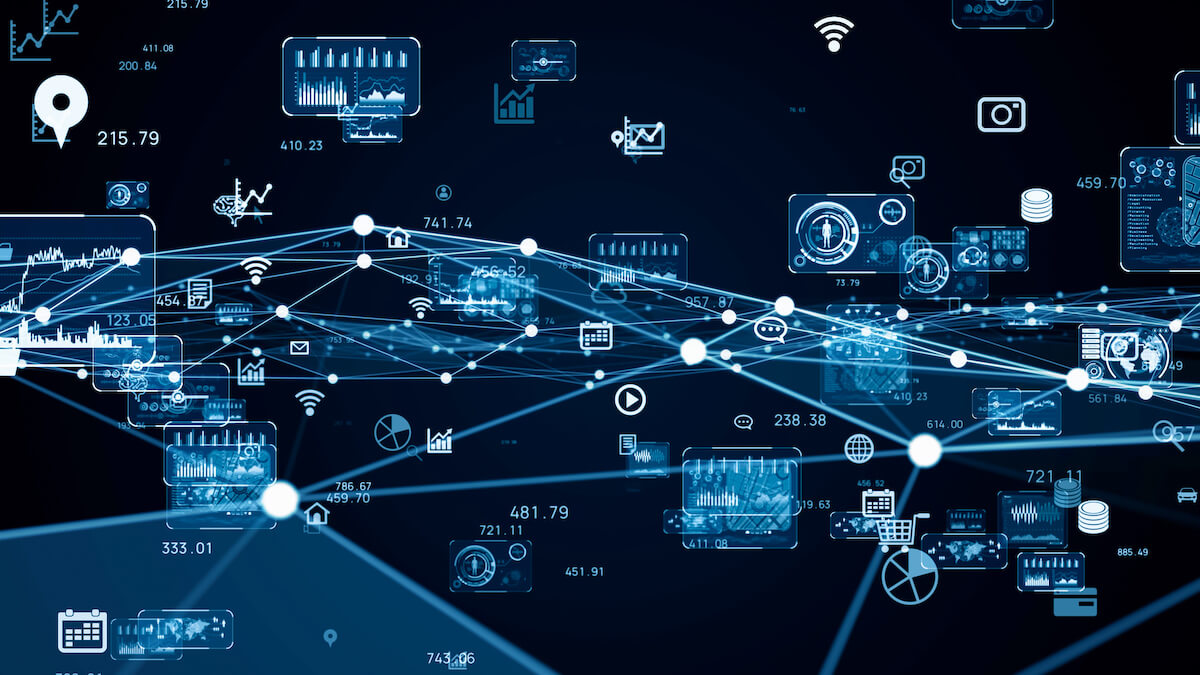The connection between digital transformation and artificial intelligence (AI) involves the latter driving the former. Businesses realize they need to accelerate digital transformation efforts to achieve efficiencies, reduce costs, improve customer experiences, and better distribute their resources. The velocity at which they accomplish this improves when they leverage AI.
Although it’s common knowledge that AI and digital transformation have a close relationship, you may still be seeking clarity. AI can often fall into a murky black box behind the scenes, but it should be in the spotlight of any digital transformation strategy.
The Relationship Between Digital Transformation and Artificial Intelligence
Digital transformation is a term that grabs headlines and investment dollars. Most organizations have a strategy and are working toward goals, but it’s not a straight path. That’s because digital transformation isn’t just one thing or applicable to only one industry, department, or role. It’s dynamic and involves adopting technology, processes, and methodologies to achieve efficiency, value, and innovation. It looks different for every company based on their workflows, requirements, and customer needs.
Technology adoption is where AI and machine learning enter the story. Digitally transforming processes isn’t just automating tasks. There is a clear distinction between this kind of automation, RPA (robotic process automation), and AI.
RPA transfers simple, repetitive tasks from humans to robots. It can generate data but can’t analyze it. AI handles more complex tasks. It can analyze data and react to its environment. AI can learn based on inputs, identify patterns, and even predict outcomes.
RPA is critical to digital transformation, but it’s a small step in the journey. Adding AI to it creates intelligent automation. When you harness AI, digital transformation can graduate to the next level and automate more complicated tasks that drive value. AI—and, by extension, intelligent automation—are a formidable team to move a digital transformation engine along. So how are things working thus far?
The Current Impact of AI on Digital Transformation
The current impact of AI on digital transformation is enormous. You don’t have to be a billion-dollar company or have a mature operation to reap the benefits. You can even be at the start of your digital transformation and benefit.
The reality is that many organizations are already using AI to facilitate digital transformation. In fact, 50 percent of businesses use AI for at least one function or area. Additionally, it’s predicted that 90 percent of new enterprise applications will include AI in processes and products by 2025.
This investment applies across many areas. Here are a few examples:
Customer Experience
Intelligent automation can play a role in routing tickets to the right agents and powering chatbots or self-service support. It can also provide relevant information to agents—such as knowledge base articles and past tickets—to help them resolve issues faster. This application delights customers and lessens the strain on your customer service team.
IT and Security
With AI powering intelligent automation, you can detect and deter more cyber threats. AI supports exercises like scanning and monitoring networks and can even predict risk. The threat landscape for cyberattacks is only expanding. It’s impossible to have human labor scale out the process, so organizations rely on AI. In a report from Capgemini, 69 percent of organizations agreed that AI helped them withstand cyberattacks, and 75 percent noted that AI enabled them to respond faster to data breaches.
Marketing
Marketers love data, but it’s hard to do much with it when it’s coming from multiple sources and in many formats. RPA is the first part of the process, aggregating structured data and standardizing it for use. Then intelligent automation can take over, analyzing it to find patterns and insights that allow companies to connect with customers. As a result, a marketing team can better target campaigns and increase revenue.
Sales
The sales process uses intelligent automation for sales ops and customer insights. It can also automate the sales funnel, triggering notifications to the sales team when a lead becomes marketing or sales qualified. It can also play a role in establishing price, especially if you’re selling something that increases in cost due to demand.
For customer insights, sales can use data collected from closed-won business. AI could identify specific activities that led to the customer completing the purchase. This is valuable knowledge that can help the sales team become more effective.
Healthcare Delivery
The healthcare industry is embracing AI to achieve digital transformation. Repetitive tasks can waste time, increase costs, and get in the way of patient care. Using RPA to automate them has been the baseline, and intelligent automation takes it to a new level.
Healthcare organizations that deploy AI can reduce time to treatment. AI can find gaps in care so that organizations can address them for better outcomes. Additionally, AI helps healthcare practices and hospitals file accurate claims, reducing the number of denials.
Finance and Accounting
Finance and accounting are data- and document-heavy fields. RPA can remove manual processes associated with data collection. And with AI, the system can do more, including finding errors.
These industries can also use intelligent automation to:
- Match payments with invoices to accelerate the process.
- Mitigate risks by flagging suspect payments.
- Ensure compliance with regulations by segmenting transactions and accounts.
With all these possibilities, what comes next?
What Does the Future Hold for Digital Transformation and AI?
Looking ahead, what’s next for digital transformation and AI? There has been a significant acceleration of intelligent automation in the past two years. The pandemic created urgency like never before, and automation maps that were projected to take years became a priority. That’s evident with the finding that 52 percent of companies accelerated AI adoption during COVID.
For example, Frito-Lay ramped up its digital and data-driven initiatives in 2020. What they planned to complete in five years was accomplished in only six months. The company was gearing up to launch a direct-to-consumer business. The pandemic made this more important, so they did it in record time. They relied heavily on automation and AI to get there.
In the post-pandemic world, things look just as crucial for innovation. No crystal ball exists to foretell what comes next, but we’ve got a few ideas.
Digital transformation with AI’s support will:
- Be a solution for labor challenges and skill shortages in various industries.
- Lead to more complex data analysis and faster insights that companies can apply in real time for marketing, logistics, and more resilient supply chains.
- Create more disruptions in mature industries by lowering the barrier to entry.
- Be a problem-solver that’s scalable across an enterprise.
How Will You Leverage AI in Digital Transformation?
The power of AI in meeting digital transformation goals is proven and quantifiable. How you choose to use it will depend on what you want to accomplish. It begins with a strategic automation program and journey.
Learn more about how to succeed by watching our on-demand webinar, “Idea Mining: Supporting Digital Process Automation.”



